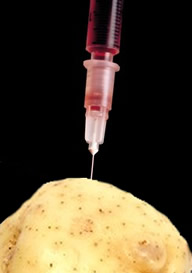Feb 14 2005
 Genetically engineered potatoes offer new hope in the fight against the Hepatitis B Virus (HBV), an acute sometimes fatal form of viral hepatitis caused by a DNA virus that persists in the blood serum and is transmitted by sexual contact or by transfusion or by ingestion of contaminated blood or other bodily fluids.
Genetically engineered potatoes offer new hope in the fight against the Hepatitis B Virus (HBV), an acute sometimes fatal form of viral hepatitis caused by a DNA virus that persists in the blood serum and is transmitted by sexual contact or by transfusion or by ingestion of contaminated blood or other bodily fluids.
According to researchers at Roswell Park Cancer Institute (RPCI) and their colleagues at Arizona State University. The vaccine, which consists of only one protein from the virus, may be safer than other oral vaccines that use weakened living viruses. The research is published in the current issue of Proceedings of the National Academy of Science of the United States of America.
In a placebo-controlled, double-blind, Phase I study, 42 adult healthcare workers, who previously responded to a licensed, injectable vaccine, received an oral booster dose delivered in transgenic potatoes that expressed the hepatitis B surface antigen. Blood serum antibodies increased in 10 of 16 volunteers (62.5%) who ate three doses of potatoes and in 9 of 17 volunteers (52.9%) who ate two doses of transgenic potatoes. It did not increase in volunteers who consumed the non-engineered potatoes.